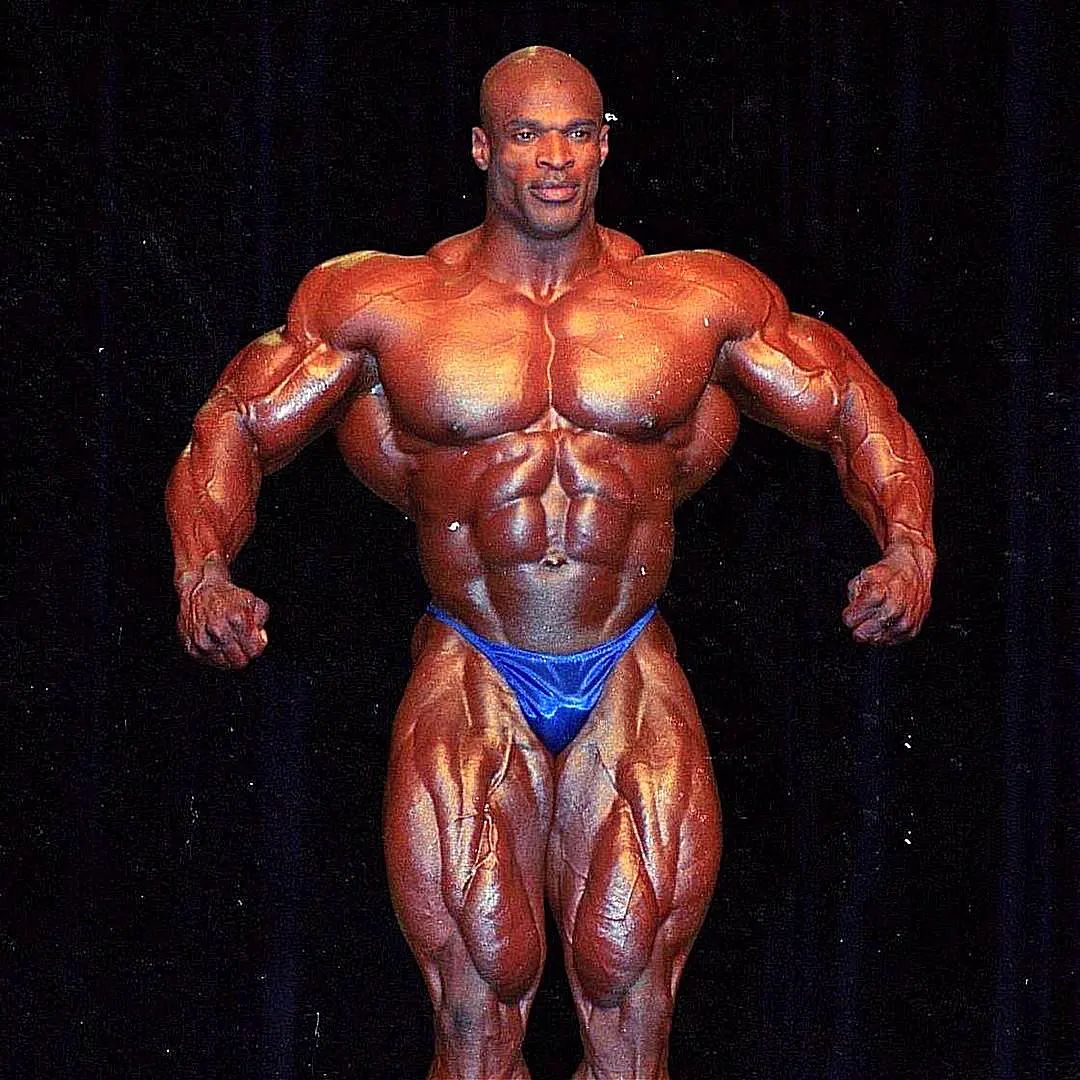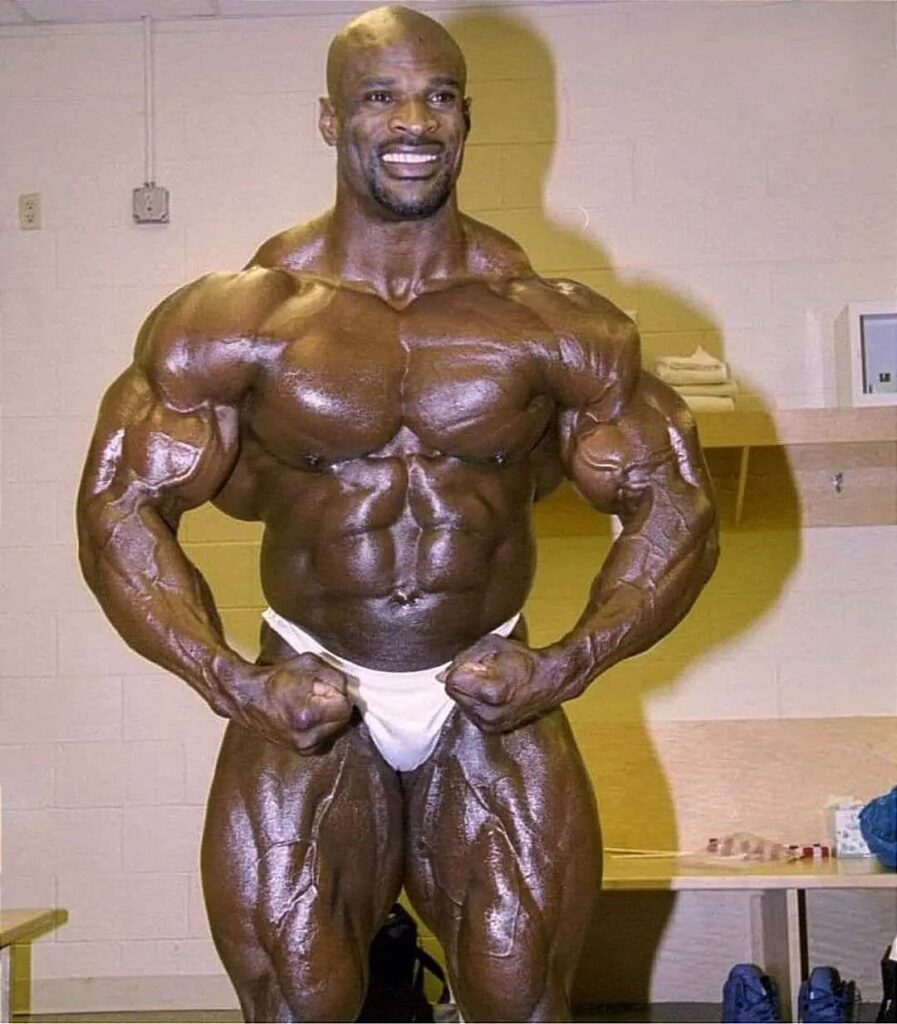Legendary bodybuilder Ronnie Coleman is well-known for his remarkable figure and his eight Mr. Olympia victories.
He was able to develop the muscular mass and power required to rule the stage thanks to his off-season, the time when he wasn’t training for a competition.
We’ll examine Ronnie Coleman’s off-season in greater detail in this piece, including his exercise schedule, diet, and outlook.
Training Regimen
The goal of Ronnie Coleman’s off-season training was to gain the most muscle bulk possible.
He focused his training on complex exercises like squats, deadlifts, and bench presses while using hefty weights.
He usually exercises every muscle twice a week, with a day off in between. The use of increasing overload was one of Ronnie Coleman’s off-season training’s important components.

This is the notion that you should gradually increase the amount of weight you carry or the number of reps you complete to continue making progress.
This method was perfected by Ronnie Coleman, who continually pushed himself to perform more repetitions or raise heavier weights than he had in previous exercises.
Ronnie Coleman’s off-season training routine also emphasized correct technique when moving weights.
This method not only helped him avoid injuries but also allowed him to engage and stimulate the muscle fibers he wanted to target.
Ronnie Coleman was well known for his focus on performing movements with flawless technique.
Ronnie Coleman Diet
Ronnie Coleman needed to ingest a lot of energy during the off-season to gain muscular bulk.
He followed a high-protein diet that included lean protein sources such as poultry, seafood, and egg whites.
In addition, he ate complex carbs such as brown rice and sweet potatoes, as well as healthy fats such as avocados and walnuts.
Ronnie Coleman would consume six to eight dinners per day, two to three hours apart.
He was strict about meal scheduling, and eating a protein-rich meal within 30 minutes of completing an exercise to maximize muscle repair and development.
Ronnie Coleman prioritized supplementation as part of his exercise regimen during the off-season.
To help his muscles develop and recuperate after exercises, he included a range of supplements such as whey protein, creatine, and glutamine.
He also used supplements to help him metabolize fat and have the energy he needed to push through his exercises and remain busy all day.
Ronnie Coleman Mindset
The mindset of Ronnie Coleman was perhaps the most remarkable part of his off-season. He was extremely committed to his training and diet, and he handled his offseason with the same intensity and concentration that he used in his competition preparation.
Ronnie Coleman was always searching for methods to better himself, both in and out of the gym. He was well known for his work ethic and desire to work harder than anyone else.
“There is no substitute for hard work,” he once said. “If you want to succeed, you must labor harder than everyone else.”
Ronnie Coleman’s capacity for long-term motivation was another essential component of his mentality. It is easy to lose drive when progress is sluggish because adding muscular bulk is a gradual process.
Ronnie Coleman was able to maintain his concentration on his objectives and keep working hard even when results weren’t visible right away.

In addition to adding muscular bulk, Ronnie Coleman focused on keeping a lean body during the off-season.
He frequently incorporated exercise into his workouts to eliminate fat and maintain his lean physique.
He would usually follow his weight training workouts with 30 minutes of exercise, either on a machine or a stationary bike.
Ronnie Coleman gave careful attention to his recovery in addition to his usual exercise and diet. After strenuous exercises, he would get plenty of rest and slumber, enabling his body to repair and rebuild.
To keep his musculature in good condition and avoid accidents, he also employed a variety of rehabilitation methods, such as massage, chiropractic treatment, and stretching.
Ronnie Coleman’s method of working out his weaker muscular groups during the off-season was another distinctive feature.
He would alter his workout to concentrate on those muscles from various perspectives rather than just adding more sets or reps of the same movements.
For instance, he would add more incline bench presses and flies to his regimen to focus on the top part of his chest if he thought it was lacking.
The off-season for Ronnie Coleman also involved cerebral training. He used to picture himself accomplishing his objectives both in the exercise and on stage.
He frequently viewed videos of his prior contests to spot areas where he could get better, and he used this knowledge to modify his training and nutrition.
Ronnie Coleman’s off-season was one of the most remarkable because of his ability to stay motivated and focused year after year.
He would set precise goals for himself, like losing a certain amount of weight or raising his maximum bench press, and he would put in an endless effort to accomplish those targets.
His commitment and tenacity were genuinely unparalleled, and they were key factors in his accomplishments as a bodybuilder.
Take Away
Ronnie Coleman’s off-season was critical to his success as a bodybuilder, allowing him to grow the muscle mass and power required for stage supremacy.
It also showed his steadfast commitment and exceptional work ethic. Ronnie Coleman accomplished his goals and established himself as one of the most extraordinary bodybuilders of all time by following a rigorous training routine, eating a protein-rich diet, and maintaining a determined mentality.
The off-season for Ronnie Coleman was a crucial part of his weightlifting career. It allowed him to develop the muscles and strength he required to deliver an outstanding performance on stage, and it showcased his praiseworthy dedication and diligence.
With his stringent workout regimen, protein-rich diet, and unflinching attitude, Ronnie Coleman drove himself to the limit and achieved his goals, eventually rising to the status of one of the most illustrious bodybuilders of all time.
FAQ’s
He trained each muscle group twice a week using complex exercises like squats, deadlifts, and bench presses with increasing overload.
He also emphasized proper techniques to target specific muscle fibers.
He also consumed complex carbohydrates such as brown rice and sweet potatoes, as well as healthy fats such as avocados and walnuts.
He would eat six to eight meals per day, each two to three hours apart.
He also took supplements to help him metabolize fat and maintain his energy levels.
He set precise goals for himself, visualized himself achieving those goals, and put in an endless effort to accomplish them.
He also focused on maintaining a lean body and promoting recovery through rest, sleep, and rehabilitation methods like massage and chiropractic treatment.
For instance, he added more incline bench presses and flies to focus on the top part of his chest if he thought it was lacking.
Related Article: Ronnie Coleman Today
Related Article: Ronnie Coleman Coach
